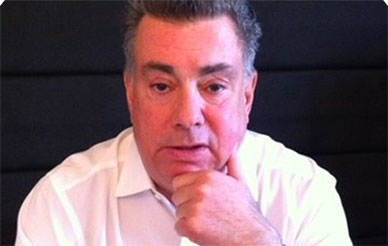Michael Sweig: Knowledge is power

When Michael Sweig was diagnosed with chronic lymphocytic leukemia (CLL) in 1999, he wasn’t content to just take doctor’s orders and see what happened. He delved into the field of blood cancers, reading medical journals, attending conferences and amassing enough knowledge to discuss the subject on equal footing with specialists. For Michael, a retired business executive with 40 years in the building maintenance industry including founding Lakeside Building Maintenance in Chicago, the diagnosis launched a new chapter of his life as a patient-advocate and philanthropist.
“I tell people that knowledge is power,” says Michael. “It became fascinating to me. If I could do my life over again, I think I’d be a physician.”
His journey took him to some of the nation’s very best cancer centers where he received treatment from top experts. Today, he supports several oncology centers and organizations through generous contributions toward research that is advancing our understanding of cancers including CLL, but Dr. Thomas Kipps at UC San Diego Moores Cancer Center stood out. They first met 12 years ago when Dr. Kipps presented a lecture at Northwestern University. Michael has since become a patient and longtime supporter of Dr. Kipps’ research.
“Tom Kipps is the best clinician I have dealt with in regards to my CLL,” says Michael. “He truly cares for his patients. He treats each patient as an individual and shows a warmth and kindness with every patient, every time. And the research being conducted by his lab is outstanding and concentrates specifically on CLL.”
Dr. Kipps is known worldwide for his work in cancer research, immunology and gene therapy. Kipps Research Lab at UC San Diego Moores Cancer Center is the birthplace of several key breakthroughs that led to the development of therapeutics that are currently the standard of care for blood cancers such as CLL. While there is still no cure for CLL, these treatments have been successful in bringing patients to almost full remission.
Michael has become so immersed in the research community that he has become a point person for friends and acquaintances who know someone struggling with CLL or similar conditions. Case in point: a friend recently contacted Michael in a desperate attempt to help a friend with CLL whose treatment regimen did not seem to be working. Michael referred that person to Dr. Kipps. “She’s doing so much better. She was on the verge of death, and Tom saved her life. You’ve got to get to the right doctor and know what you’re doing. He has been able to do wonderful things for his patients.”
Another key reason Michael supports Dr. Kipps’ research is that as new and promising oncology therapies emerge, funding available to continue making progress on more established approaches can wane. In the case of leukemia and related cancers, these new therapies can sometimes carry greater risk and adverse side effects, leaving a funding gap for pursuing advancements in treatments like chemotherapy and existing drugs that are currently successful in extending and improving patients’ lives. “Supporting cancer research, especially the hematological malignancies, is very important for both current and future patients,” says Michael.
“I am so honored by the loyalty and generosity of donors like Michael,” says Dr. Kipps. “It is incredibly humbling that they trust me and our team with their care, and that they trust us with their philanthropy enough to make new discoveries. Their support makes me so energized to get into the lab and make progress in understanding and treating these cancers.”
Michael’s message to those considering joining him in supporting the work of Dr. Kipps is simple: “Let’s make CLL a disease of the past.”
Consider supporting Dr. Kipps' work with a donation to Blood Cancer Research.